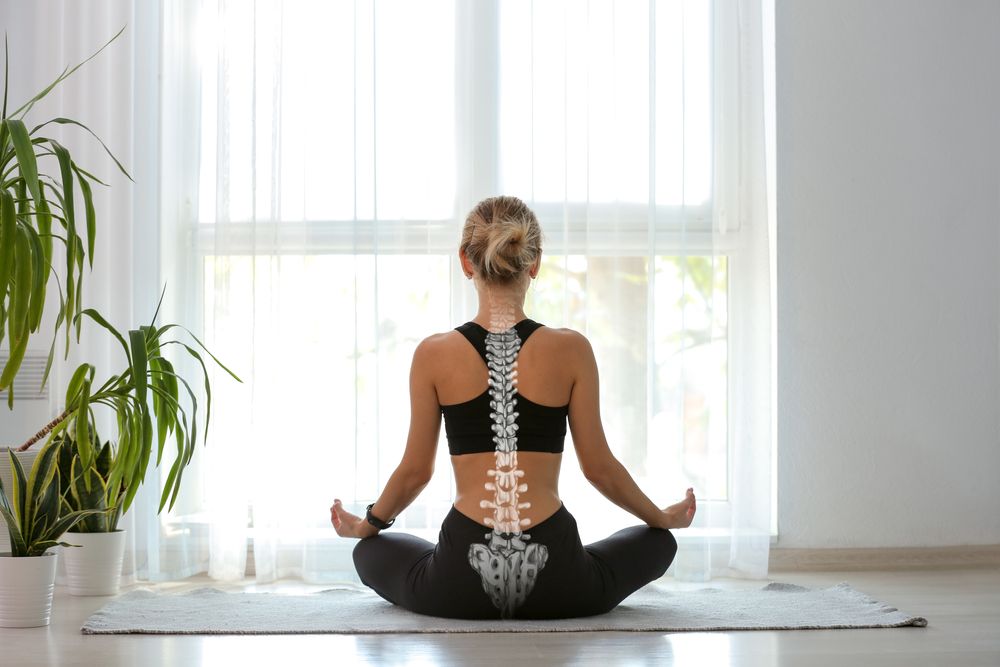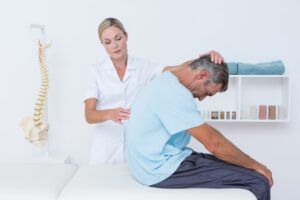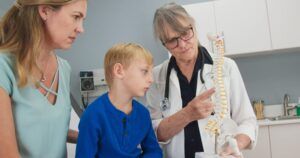Women’s spine health requires a specialized approach due to unique biological and lifestyle factors that influence spinal well-being. Hormonal fluctuations, pregnancy, and conditions like osteoporosis significantly impact spine health, creating distinct challenges. At Spine, Neck, & Back Specialists, Dr. Jay Reidler is dedicated to addressing these unique needs, offering expert care in Bloomfield, Englewood, and Union City, NJ. This blog highlights the specific spinal challenges women face and offers evidence-based strategies for prevention and care.
The Anatomy of Women’s Spine Health
While the basic structure of the spine is similar in men and women, several differences make women more susceptible to spine issues. Women’s lower bone density, wider pelvic structure, and hormonal influences create unique vulnerabilities. These differences affect spinal alignment, joint mobility, and muscle support.
Hormonal shifts, such as those experienced during the menstrual cycle, pregnancy, and menopause, also play a significant role in spinal health. These fluctuations can weaken connective tissues, impact bone density, and exacerbate pain conditions like sciatica or lower back pain.
Common Spine-Related Challenges in Women
- Osteoporosis: Osteoporosis is a condition where bones lose density and become fragile, significantly increasing the risk of spinal fractures. Women are more likely than men to develop osteoporosis, especially after menopause, due to reduced estrogen levels.
- Pregnancy-Related Spine Issues: The added weight and changes in posture during pregnancy often strain the spine. Conditions like sciatica, where pressure on the sciatic nerve causes pain, are particularly common in expectant mothers.
- Chronic Pain Conditions: Conditions such as fibromyalgia disproportionately affect women. These often involve widespread musculoskeletal pain, including discomfort in the spine and back.
- Postural Problems: Women are more prone to postural issues like kyphosis, an exaggerated forward curve in the upper back. Poor posture from carrying heavy handbags or breastfeeding can also contribute to back pain.
- Hormonal Influences: Hormonal changes during the menstrual cycle or menopause can lead to inflammation, joint pain, and ligament laxity, all of which can affect the spine’s stability and function.
Preventive Strategies for Women’s Spine Health
Maintaining spine health requires proactive care and lifestyle adjustments. Preventing osteoporosis begins with a diet rich in calcium and vitamin D, which can be found in foods like dairy products, leafy greens, and fortified cereals. Weight-bearing exercises such as walking, jogging, and yoga are also crucial for strengthening bones and reducing the risk of fractures. A strong core is equally vital for spinal support, and exercises like planks, bridges, and Pilates help improve stability while reducing strain on the lower back.
Proper posture plays a significant role in minimizing spinal stress. Women should avoid slouching and ensure their workstations are ergonomically designed to promote alignment. For pregnant women, lumbar support pillows can alleviate lower back strain. Safe lifting techniques are also essential to prevent back injuries; bending at the knees and avoiding twisting the spine when lifting heavy objects can help reduce strain.
For those experiencing hormonal fluctuations, consulting a healthcare provider can help manage related joint or back pain. Hormone replacement therapy (HRT) or specific supplements may provide relief in some cases. Staying active is another key component of spine health. Activities like swimming, tai chi, and yoga are gentle on the spine while keeping it flexible and muscles strong, promoting overall fitness and reducing the likelihood of spinal issues.
Treatment Options for Spine Conditions
When spine issues do arise, early intervention is key to preventing further complications. Dr. Jay Reidler at Spine, Neck, & Back Specialists offers comprehensive care tailored to women’s specific needs.
Non-Surgical Treatments
- Physical Therapy: Customized programs to restore strength, flexibility, and function.
- Chiropractic Adjustments: Techniques to realign the spine and reduce nerve compression.
- Pain Management: Non-invasive options such as anti-inflammatory medications or epidural injections for immediate relief.
Minimally Invasive Surgery
For more severe cases, minimally invasive procedures, such as microdiscectomy or vertebroplasty, address conditions like herniated discs or vertebral fractures with minimal downtime.
Long-Term Rehabilitation
Post-treatment rehabilitation focuses on preventing recurrence through strengthening exercises, posture correction, and lifestyle changes.
Women’s Spine Health During Pregnancy
Pregnancy places unique demands on a woman’s spine. As the uterus expands, the center of gravity shifts, increasing strain on the lumbar region. This can lead to lower back pain, pelvic discomfort, and even nerve impingement.
To mitigate these issues, pregnant women should:
- Perform gentle stretching exercises designed for pregnancy.
- Wear supportive footwear to reduce strain on the lower back.
- Use maternity belts for added support during daily activities.
Why Early Intervention Matters
Ignoring spine-related symptoms can lead to chronic pain, limited mobility, and diminished quality of life. Women often delay seeking care, attributing back pain to temporary factors such as stress or overexertion. However, addressing spine issues promptly prevents further damage and supports overall health.
Whether you’re managing osteoporosis, recovering from pregnancy-related back pain, or addressing chronic discomfort, Spine, Neck, & Back Specialists offers expert guidance and treatment options to improve your spine health.
Empower Your Spine Health Today
Women’s spine health requires proactive care and attention to unique biological factors. By prioritizing prevention strategies and seeking expert treatment when needed, women can protect their spinal well-being and lead active, fulfilling lives. Dr. Jay Reidler and the team at Spine, Neck, & Back Specialists are here to guide you every step of the way. From preventive care to advanced treatments, we provide personalized solutions tailored to your needs.
We are committed to making advanced care accessible to all women. We proudly accept CIGNA PPO and many other insurance plans, ensuring that your treatment journey is as seamless as possible.
If you’re experiencing back pain or want to take a proactive approach to your spine health, contact us today to schedule an appointment in Bloomfield, Englewood, and Union City, NJ.
Sources
- Ensrud, K. E., et al. (2011). Osteoporosis in Older Women. New England Journal of Medicine.
- Hagen, K. B., et al. (2006). Pregnancy-Related Low Back Pain: A Review. Journal of Manipulative and Physiological Therapeutics.
- Woolf, A. D., & Pfleger, B. (2003). Burden of Major Musculoskeletal Conditions. Bulletin of the World Health Organization.




